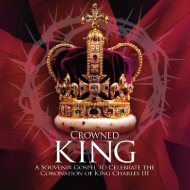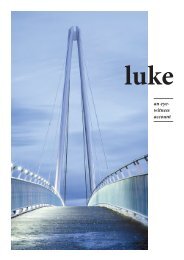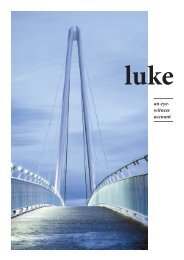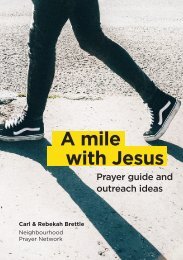Create successful ePaper yourself
Turn your PDF publications into a flip-book with our unique Google optimized e-Paper software.
The book is also the basis for a small group video series, ‘The Wellbeing Journey’ <strong>by</strong> HOPE UK and<br />
KingsGate Community Church.<br />
6 I talk about this in more detail in <strong>Dave</strong> <strong>Smith</strong>, God’s Plan for Your Wellb eing, p15.<br />
7 DA Carson, The Gospel According to JOHN (Grand Rapids, Michigan: Apollos, 1991) p646.<br />
8 <strong>Dave</strong> <strong>Smith</strong>, 40 Days with Jesus, pp58–59.<br />
9 J Blank, Krisis (Freiburg: Lambertus, 1964), p178; op cit, B Milne, The Message of John (Leicester: IVP, 1993)<br />
p298.<br />
10 I originally made these observations in <strong>Dave</strong> <strong>Smith</strong>, 40 Days with Jesus, pp71–72.<br />
11 An example of this is found in John 14:4–6.<br />
12 Paul Beasley-Murray, The Message of the Resurrection (Nottingham: The Bible Speaks Today, IVP, 2000)<br />
p102.<br />
CHAPTER FOUR: LIVING IN FREEDOM<br />
1 Nelson Mandela, Long Walk to Freedom (London: Abacus, 1995).<br />
2 www.abrahamlincolnonline.org/lincoln/education/failures.htm [Accessed December 2023].<br />
3 <strong>Dave</strong> <strong>Smith</strong>, 40 Days with Jesus (Farnham: CWR, 2014) p80.<br />
4 As David Ford explains in The Gospel of John (Grand Rapids, Michigan: Baker Academic, 2021) pp418–19:<br />
‘There is no hint of a negative judgment on them, and a positive view is that, just as Jesus has been present<br />
in the enclosed, special Sunday gatherings in Jerusalem in John 20, so he is present in Galilee as the<br />
disciples go to work and carry on ordinary life.’<br />
5 <strong>Dave</strong> <strong>Smith</strong>, 40 Days with Jesus, p81.<br />
6 <strong>Dave</strong> <strong>Smith</strong>, 40 Days with Jesus, p85.<br />
7 I first read about these similarities in David Ford, The Gospel of John, p419.<br />
8 <strong>Dave</strong> <strong>Smith</strong>, 40 Days with Jesus, p91.<br />
9 Andrew Ollerton, The Bib le: A Story That Makes Sense of Life (London: Hodder & Stoughton, 2020) page 211<br />
of 323, Kindle ed.<br />
CHAPTER FIVE: FULFILLING OUR PURPOSE<br />
1 Quotes sourced from www.goodreads.com [Accessed December 2023].<br />
2 ‘A sense of purpose helps you live longer’, 27 June 2019, www.clearvuehealth.com/b/purpose-longevityhealth/<br />
[Accessed December 2023].<br />
3 I shared this illustration in God’s Plan for Your Wellb eing (Farnham: Waverley Abbey, 2020) pp168–69.<br />
4 I read about this in Nicky Gumbel, Bib le in One Year, Day 57.<br />
5 Tim Keller, The Freedom of Self-Forgetfulness (Chorley: 10Publishing, 2012) pages 21–22, Kindle ed.<br />
6 Rick Warren, Purpose Driven Life (Grand Rapids, Michigan: Zondervan, 2002) pp17–18.<br />
7 John RW Stott, The Message of Acts (Leicester, IVP, 1990) pp171–72. Stott helpfully expands on what these<br />
various ‘goads’ may have been.<br />
8 If we examine the three accounts we see slight but significant differences in the retelling which can be<br />
explained <strong>by</strong> Luke’s own creativity as an author, and <strong>by</strong> the fact that the accounts are told in three different<br />
contexts: the first (Acts 9) is Luke’s narrative, the second (Acts 22) is Paul’s address before an angry crowd in<br />
Jerusalem and the third was Paul testifying to King Agrippa (Acts 26).<br />
9 Caravaggio, The Conversion of Saint Paul (1600–1601).<br />
10 Scholars, particularly critical ones, tend to consider that what Paul directly says about himself in his letters is<br />
to be treated as having stronger evidential value than what Luke says about Paul in Acts or where he even<br />
quotes him. Aside from the importance of going directly to the source himself, there is a consensus that both<br />
due to their early composition (no more than 15–25 years after the actual events) and to the fact that they are<br />
written <strong>by</strong> a previous opponent, Paul’s letters are considered to be the most important source for the historicity<br />
of the resurrection.<br />
11 Not only is 1 Corinthians one of the earliest New Testament documents (written only 15–20 years after the<br />
events of the first Easter), but 1 Corinthians 15:3–7 is widely considered to have been composed much earlier,<br />
not <strong>by</strong> Paul himself, but <strong>by</strong> the early Church, maybe within months of Jesus’ death. This is clearly indicated<br />
both <strong>by</strong> how Paul begins: ‘For what I received I passed on to you as of first importance’ and <strong>by</strong> the use of<br />
phrases that are not found elsewhere in his writings: ‘that Christ died for our sins according to the Scriptures,<br />
that he was buried, that he was raised on the third day according to the Scriptures’ (1 Corinthians 15:3–4, my<br />
emphasis). Then follows a summary of some of the key post-resurrection appearances: to Cephas (Peter),















